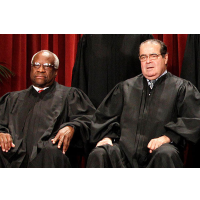Should Supreme Court Justices be Held to Same Ethics Code as Other Federal Judges?
 Clarence Thomas and Antonin Scalia (photo: Pablo Martinez Monsivais, AP)
Clarence Thomas and Antonin Scalia (photo: Pablo Martinez Monsivais, AP)
When Chief Justice John Roberts ascended from the Court of Appeals for the D.C. Circuit to the Supreme Court, he gained power, prestige and a place in history. Among his few losses was that he was no longer subject to the ethics rules that govern all federal judges—except Supreme Court justices, something a group of legislators in Washington would like to change through legislation.
Roberts, however, is fighting to keep this oddity of federal law, arguing that Congress cannot legislate for the High Court without violating separation of powers principles and that the justices’ voluntary compliance with the Code of Conduct for United States Judges means “the code plays the same role for the justices as it does for other federal judges.”
But that statement is belied by numerous activities engaged in by Supreme Court justices, especially Associate Justices Antonin Scalia and Clarence Thomas, which are considered unethical under the Code. For example, the Code would have prohibited, or raised serious questions about, all of the following:
- In 2011, Thomas and Scalia were the main speakers at a fundraiser for the Federalist Society, a conservative legal group with strong ties to Republican politics.
- In 2010, both attended secretive political events sponsored by Koch Industries intended “to review strategies for combating the multitude of public policies that threaten to destroy America as we know it,” just months after they voted in the landmark Citizens United case to allow corporate money to flood politics.
- In 2012, Thomas refused to recuse himself from the Affordable Care Act case, despite the fact that his wife, Ginni Thomas, is a lobbyist who has worked against the law and likely had a financial stake in the outcome.
- In 2012, Scalia appeared at a 2012 fundraiser for Friends of Abe, a Hollywood conservative group that champions Republican causes and candidates.
- Late last month, the newsmagazine Mother Jones reported that Ginni Thomas is playing a leading role in Groundswell, a conservative political group that has been meeting privately to coordinate messaging on key political issues, many of which will eventually come before the Court.
On Thursday, Congressional Democrats Rep. Louise Slaughter (New York), Sen. Richard Blumenthal (Connecticut), Sen. Chris Murphy (Connecticut), and Sen. Sheldon Whitehouse (Rhode Island), introduced the Supreme Court Ethics Act of 2013, which would force the high court to adopt an ethics code like the Code of Conduct. Many legal scholars support the idea, which has attracted more than 125,000 signatures on an online petition.
Although the chances of the legislation passing this year are considered close to nil, owing to the vocal opposition of Chief Justice Roberts and the quiet lack of support among Republicans, eventual success could set up a rare separation of powers of fight between the Court and Congress. Such a fight, ironically, could take the form of a legal case that would ultimately be decided by the Supreme Court itself.
-Matt Bewig
To Learn More:
Democrats To Introduce Supreme Court Ethics Bill (by Stephanie Mencimer, Mother Jones)
Supreme Court Fiddles while Ethics Questions Burn (by Daniel Rothberg, Los Angeles Times)
Supreme Court Ethics Act Proposed In Response To Controversial Behavior By Justices Scalia, Thomas (by Nick Wing, Huffington Post)
Clarence Thomas: An Ethics Problem with a Seat on the Supreme Court (by Noel Brinkerhoff and Ken Broder, AllGov)
Is Justice Clarence Thomas Guilty of Felony Ethics Violations? (by Noel Brinkerhoff, AllGov)
- Top Stories
- Unusual News
- Where is the Money Going?
- Controversies
- U.S. and the World
- Appointments and Resignations
- Latest News
- Trump to Stop Deportations If…
- Trump Denounces World Series
- What If China Invaded the United States?
- Donald Trump Has a Mental Health Problem and It Has a Name
- Trump Goes on Renaming Frenzy






Comments